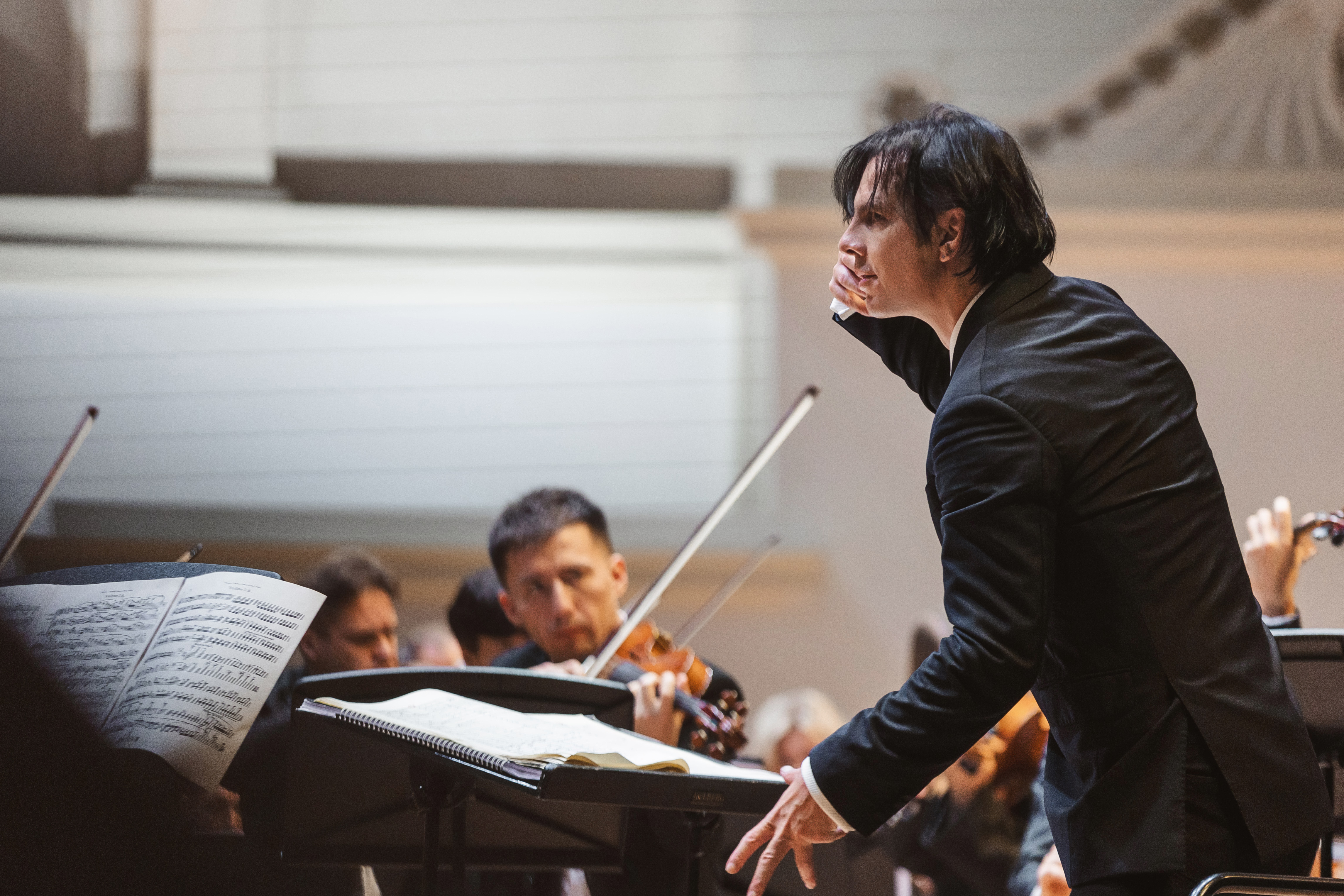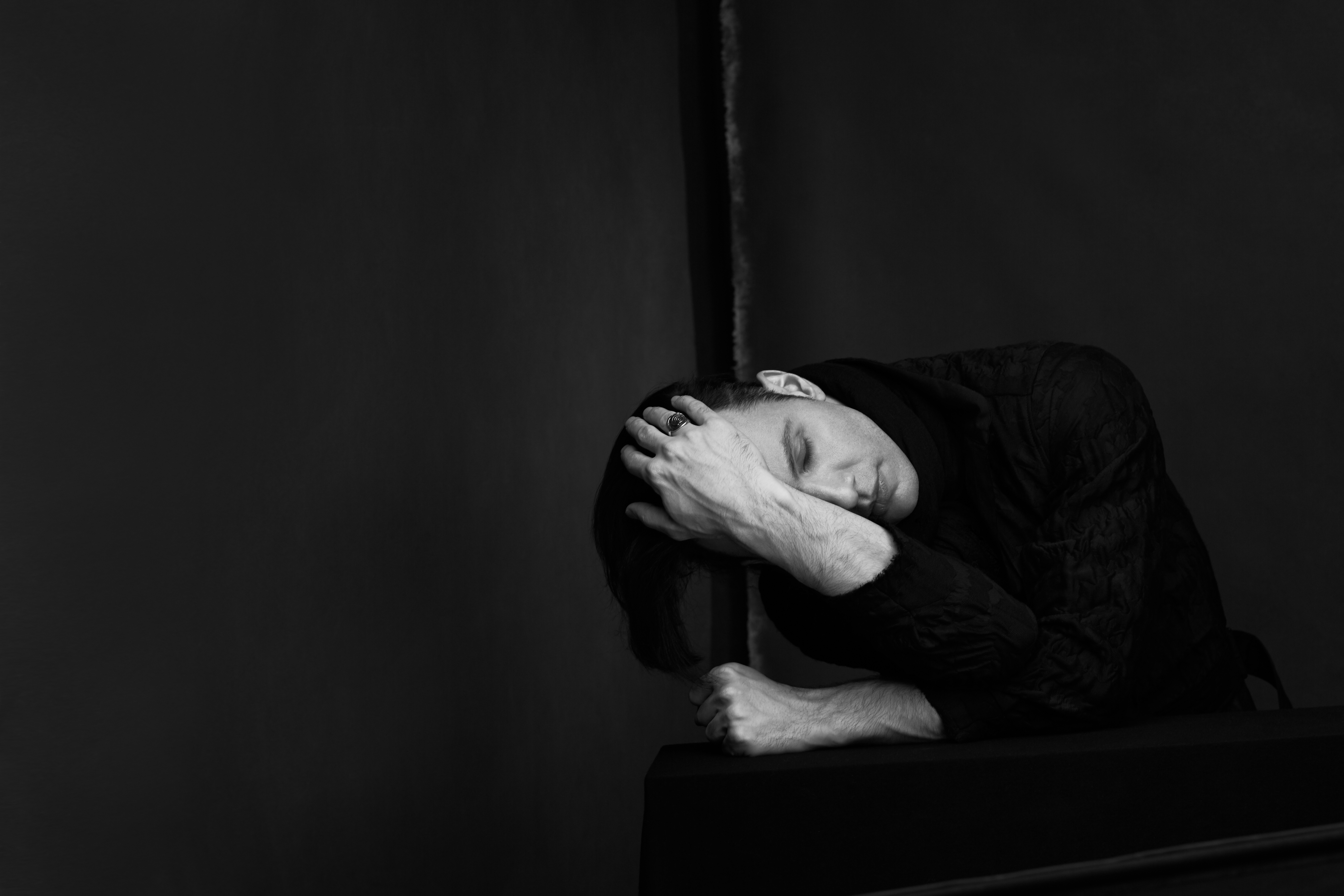
专访提奥多·库伦奇斯|Teodor Currentzis interview

响声播客
Deep Dive
与库伦奇斯大师的对话:音乐、精神与永恒
2024年10月31日,我有幸与指挥大师提奥多·库伦奇斯进行了一次线上访谈。这次对话涵盖了他在中国巡演的经历、对音乐的独特见解、与塞尔吉奥·切利比达克的比较、如何引领乐手、对年轻音乐家的期许、作品选择的标准,以及他对“历史演奏风格”的独到看法。
站立演奏:一种更自然的表达
谈及乐团站立演奏的原因,库伦奇斯认为这是一种更自然、更贴近人类本性的姿态。与坐着演奏相比,站立演奏赋予演奏者更大的肢体自由度,更利于与乐手间的互动,也更能与台下观众产生共鸣。“你能想象一位演员坐着吸引观众吗?”他反问道。站立,是与观众建立更直接联系的方式,也是他追求的舞台呈现方式。
中国巡演:精神层面的洗礼
谈及2023年的中国巡演,这并非单纯的演出经历,而是深刻的精神体验。他感受到了中国音乐的飞速发展,以及中国观众对音乐日益精深的理解。“20年前、25年前的中国古典音乐与现在相比,品质完全不同。”他如此说道。这不仅是物质层面的变化,更是精神层面的提升,体现了中国人民对艺术的追求和理想。
与切利比达克的共鸣:音乐的本质
库伦奇斯与塞尔吉奥·切利比达克常常被人们相提并论。他认为,这种比较的意义在于两人对音乐本质的共同追求——关注音乐的精神内核,而非单纯的技巧。“切利比达克曾说过,如果有人说他的演奏太慢,那是因为他们闭上了眼睛,没有真正聆听音乐的灵魂。” 这与库伦奇斯对音乐的理解不谋而合。他们都强调音乐的灵性和诗意,而非速度和技巧。
引领乐手:以身作则,而非言语教导
如何向乐手传达理念?库伦奇斯认为,这并非通过言语灌输,而是通过自身的行为和经验来影响他们。“真正的知识是当你提出问题,他们能够自己找到答案。”他强调,作为指挥,需要以身作则,展现出对音乐的真诚和投入,才能引领乐手走向共同的艺术目标。他分享了在排练马勒第五交响曲时,如何引导乐手从不同的角度去诠释作品,从而达到更深层次的音乐表达。
对年轻音乐家的期许:开放、阅读与自我探索
库伦奇斯对年轻音乐家寄予厚望。他鼓励他们保持开放的心态,直面人生的挑战,并通过阅读经典作品来提升自身修养。他推荐了从古希腊悲剧到现代诗歌,再到哲学经典的广泛阅读清单,强调语言和哲学对音乐理解的重要性。他认为,音乐家需要具备丰富的精神世界和深刻的人生体验,才能创作出打动人心的作品。
作品选择:直抵灵魂深处的表达
库伦奇斯对作品的选择标准是:能够充分展现作品内涵,并能够表达他内心深处的情感。他以马勒第六交响曲为例,解释了为何选择录制这首作品,以及他在录制过程中所投入的巨大情感。对他而言,音乐是情感的载体,是灵魂的表达。
历史演奏风格:精神内核重于形式
谈及历史演奏风格,库伦奇斯认为,应该注重音乐的精神内核,而非拘泥于形式。“我不会为了追求所谓的‘历史准确性’而牺牲音乐的灵魂。” 他强调,音乐的演绎应该随着时代的发展而不断演变,重要的是要保持对音乐的尊重和理解。
结语
与库伦奇斯大师的对话,让我对音乐、艺术以及人生有了更深刻的理解。他不仅是一位杰出的指挥家,更是一位充满智慧和哲思的艺术家。他的艺术追求,不仅仅是音乐本身,更是对人生、对精神世界的探索。他对于音乐的理解,以及他与乐手、与听众的互动方式,都值得我们深思和学习。
Why perform standing?
Performing standing is more natural and allows for better movement and interaction with the audience. It also provides more flexibility and angles for the musicians and conductor.
What was your experience of the 2023 China tour?
The 2023 China tour was very successful and received a lot of positive feedback. The audiences were deeply engaged, and the experience was enriching, especially in cities like Beijing and Shanghai, where the community and environment were diverse and vibrant.
How does your Greek heritage influence your artistry and distinguish you from other conductors?
My Greek heritage gives me a unique perspective on European classical music, especially in understanding the ancient roots and philosophical underpinnings. This influences my interpretation and approach to music, making it distinct from other conductors.
What are your thoughts on Sergio Celibidache and his approach to music?
Sergio Celibidache was a profound musician who emphasized the spiritual and physical aspects of music. He believed in creating a deep, immersive experience for the audience, often choosing slower tempos to allow for deeper engagement. His approach resonates with my own philosophy of music.
How do you convey your ideas to musicians?
I convey my ideas through a combination of philosophical discussions and personal examples. I believe in leading by example and encouraging musicians to explore their own emotional and spiritual depths, which helps in creating a more authentic and powerful performance.
What books and poetry do you recommend to young musicians?
I recommend young musicians to read ancient Greek philosophers like Heraclitus, Anaximander, and Anaximenes, as well as modern poets like Ivan Gol, John Keats, and Rainer Maria Rilke. These works provide a rich foundation for understanding the deeper emotional and philosophical aspects of music.
What is the significance of Mahler's Sixth Symphony in your repertoire?
Mahler's Sixth Symphony is significant for its deep emotional and philosophical content. I approach it with a focus on the inner pain and struggle, which I believe is essential for a truly powerful and authentic performance.
What criteria do you use to choose works for recordings?
I choose works for recordings based on their emotional depth and the potential for a unique and profound interpretation. I also consider the historical and cultural context of the pieces, ensuring they resonate with modern audiences.
What can we expect from your record label Theta in 2025?
In 2025, Theta will release a series of exciting new albums, including recordings of Mahler's First and Third Symphonies, Beethoven's Ninth Symphony, and Bruckner's Ninth Symphony. These recordings will showcase the depth and quality of our interpretations.
What was your experience as an actor in the DAU project?
My experience as an actor in the DAU project was intense and transformative. It required me to step out of my comfort zone and explore different aspects of my personality. The project pushed me to be more honest and authentic, which was both challenging and rewarding.
What qualities do you look for in musicians for your orchestra?
I look for musicians with exceptional technical skills, a deep understanding of both ancient and modern music, and a strong spiritual and imaginative capacity. It's crucial that they can connect with the music on a profound level and contribute to a cohesive and powerful performance.
What is your view on historically informed performance styles?
I believe that historically informed performance styles are important for understanding the original context of the music. However, I also think that modern interpretations can bring new and valuable perspectives. The key is to balance authenticity with creativity and emotional depth.
- Conductor's reflections on the 2023 China tour.
- Overwhelmingly positive audience response.
- Observations on the unique cultural and artistic scenes in China.
- The evolving understanding and appreciation of classical music in China.
Shownotes Transcript
This is a Zoom interview between Shanghai and Stuttgart, which took place on Oct. 31, 2024. Non-Mandarin listeners please skip to 00:45.
感谢吴氏策划牵线,近日非常荣幸地采访了指挥家提奥多·库伦奇斯。本期节目是整场全英文的采访内容,相应的中文对谈节目会在稍后几日上线。感谢你们的关注和支持!


00:45 破冰,站立演出不累吗?Why perform standing?
05:26 2023中国巡演感受 China Tour
11:34 希腊基因和艺术见解如何区分库伦齐斯与其他指挥家?Greek root and what distinguishes him from other conductors.
16:21 因音乐见解谈到斯图加特前辈切利比达克 on Celibidache
21:16 如何向音乐家们传递你的思想 how to convey ideas to musicians
27:42 读书、读诗,语言,年轻艺术家 books, poetry, language, and influence on young musicians
36:55 马勒第六交响曲 Mahler's Sixth
39:04 如何选择录制成专辑的作品 Works that ends up in recordings and those don't
43:29 库伦奇斯的唱片公司 Theta 和新的布鲁克纳第九交响曲专辑 Theta, and Bruckner's Ninth.
45:19 2025大量专辑惊喜来袭 what to expect for 2025
50:06 马勒第三交响曲 Mahler's Third
52:59 最近在读什么书?What are you reading?
56:13 作为演员出演DAU的经历 Acting stint in DAU
59:19 如何挑选乐手 criteria for picking musicians
61:27 如何看待“本真风格” on "historically informed performance styles"